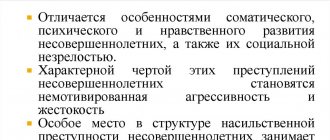For attempted robbery, Russian legislation imposes criminal liability, which can reach up to 3/4 of the punishment for robbery.
Dear readers! To solve your specific problem, call the hotline or visit the website. It's free.
8 (800) 350-31-84
Russian legislation contains punishment not only for committed crimes, but also for unfinished crimes in which criminal intentions were never realized. One of the forms of this act can be considered attempted robbery.
Attempted robbery article
Robbery is considered a completed crime only if the offender has used or had the potential to use the stolen property. What is meant by attempted crime in criminal law is indicated in Art. 30 of the Criminal Code of the Russian Federation. Based on its norms, attempted robbery is a person’s deliberate actions that are directly aimed at committing robbery. At the same time, the robbery itself is not completed due to circumstances beyond the control of the attacker.
Responsibility for attempted robbery is significantly lower than for a crime that was completed and declared completed. When passing a sentence, the court takes into account the circumstances due to which the robber was unable to complete the crime, the nature and degree of public danger of the robber’s actions, the personal characteristics of the defendant, as well as circumstances that aggravate or mitigate the guilt of the failed robber.
Note! The maximum amount or term of criminal punishment for attempted robbery cannot exceed 3/4 of the maximum amount or term of the most severe type of punishment, which is provided for by the relevant sanctions part of Art. 161 of the Criminal Code of the Russian Federation.
What preventive measures are determined
According to Art. 66 of the Criminal Code of the Russian Federation establishes the rules that are applied when assigning a preventive measure for attempting to commit any crime:
- all circumstances that led to the incompleteness of the offense must be taken into account;
- for preparation to commit a crime, the term or amount of punishment should be determined to be no more than ½ of the maximum that is provided for this crime ;
- for an attempt to implement it - no more than ¾ of the same terms.
Let's give an example of such a calculation. According to Part 1 of Art. 161 of the Criminal Code of the Russian Federation for ordinary robbery, without any aggravating circumstances, provides for imprisonment for 4 years. Accordingly, a prison sentence of more than 3 years cannot be imposed for attempting such a crime.
Arbitrage practice
Let us look at several examples of such an offense from judicial practice. This will help to better understand the principles of how penalties are imposed for this offense.
A suspended sentence may also be imposed for attempted robbery.
A group of people, including minors, tried to rob the apartment. The police managed to stop them. Those persons who had already turned 14, but were not 18 years old, were given a 1.5 year suspended sentence of imprisonment, and an adult – 7 years with a fine.
The offender snatched a smartphone from the hands of another person on the street and tried to escape, but passers-by stopped him. The phone was returned to the victim, and the accused was sentenced to 1 year of suspended imprisonment.
An intoxicated citizen tried to steal a woman's suitcase in a train carriage right in front of her. They were able to stop him and stop his illegal actions. The court sentenced him to imprisonment for 1 year to be served in a maximum security colony.
Exemption from preventive measures
In order to avoid fair punishment for an attempted robbery, it is mandatory to admit your guilt and compensate for the damage caused in the amount and type determined by the injured party.
To avoid liability, you need to admit your guilt and compensate the harm caused to the injured party.
In this case, you can count on leniency from the justice system, but with an important condition: in the absence of a criminal record under the same articles.
Robbery from the point of view of legislation and its features
Robbery, according to the norms of the Criminal Code of the Russian Federation, is the open theft of someone else's property. It is always characterized by the selfish interest of the criminal and his deliberate actions to unlawfully achieve his plans. During a robbery, the criminal realizes that the owner of the thing he is attempting to steal, or the people around him, understand that a crime is happening. Whether someone resists the robber is of no importance for the qualification of the crime (Resolution of the Plenum of the Supreme Court of the Russian Federation “On judicial practice in cases of theft, robbery and robbery” dated December 27, 2002 No. 29). Responsibility for committing robbery begins at the age of 14.
Robbery: concept, features, moment of crime
Robbery is a type of theft of property. The main distinguishing property of robbery is its openness, i.e. the criminal steals someone else's property in front of witnesses or the victim. At the same time, the robber realizes that he is breaking the law with his actions. If a criminal acts secretly, then his actions cannot be classified as robbery , but are theft.
In addition to direct intent, robbery is characterized by the robber’s selfish goal: his desire to take possession of someone else’s property and dispose of it at his own discretion.
Another feature of robbery is its predominantly non-violent nature. At the same time, the possibility of using violence during robbery exists, but it is necessary to exert psychological or physical pressure on the victim and is required in order to break resistance. A crime can be classified as robbery only if the violence used did not have serious consequences for the health of the victim. For example, this could be tying hands, causing bruises, hematomas, etc.
If, during the theft, serious harm to health was caused, or it could potentially be caused, then such a crime is classified as robbery.
The moment of the crime is the moment of appropriation of someone else's property by the robber, when he flees the crime scene with the loot. The robbery is considered completed when the criminal has a real opportunity to dispose of the loot at his own discretion.
Theft and robbery
Both robbery and theft are types of theft of other people's property. Theft is secret theft, robbery is open theft. When the item is stolen, the owner of the item is faced with the fact of a crime that has already occurred, having discovered the loss. When theft occurs, in most cases, the owner of the item himself becomes a participant in the illegal events taking place. The robber acts brazenly, without hiding, counting on the fear of the victim or those present. In addition, during a robbery, the victim, seeing the behavior of the robber, is often afraid to stop his unlawful actions. This is justified, because robbery can develop into robbery, and the person who tried to stop the criminal can suffer serious physical harm.
Definition of a completed robbery and specific examples
The robbery will be considered completed if the property is confiscated and the perpetrator has a real opportunity to use it or dispose of it at his own discretion (for example, to turn the stolen property into his own favor or for the benefit of other persons, to dispose of it for personal gain in another way).
- Robbery in a store . Example: A criminal in a store steals goods in front of astonished customers. He pushes the stolen goods into his backpack. He puts small things in his pocket and rushes to the exit. On his way out, a security guard stops him. The robber hits the guard in the face and manages to escape with the stolen goods and the items he stole. They try to detain the robber, but to no avail.
- Robbery with the use of violence (how is violent robbery different from robbery?). Example: A criminal snatches a purse from a woman’s hands, strikes her several times with his hand and disappears with the purse in an unknown direction. On the way, he is detained by a random passerby who saw what happened. However, the criminal pushes away the rescuer, who falls to the ground from his blow. Then he disappears from the sight of the victims. The stolen property of the victim is at his full disposal.
- Robbery without aggravating circumstances . Example: A man on a train decided to steal a digital player from one of the passengers. After committing the crime, he fled with the stolen property, causing only material damage to the victim. In this case, the player remains with the criminal.
You can find out about the types of robbery here.
Using the articles posted on our website, you can find out what punishment you face for robbery, including that committed by a group of persons by prior conspiracy.
What is the right thing to do in a situation of attempted robbery?
The required set of actions in case of attempted robbery depends on the specific situation, as well as the party represented by a certain person.
If this is a victim, he needs:
- file a complaint with law enforcement agencies as soon as possible (by telephone, by personal visit to the nearest police department, via the Internet, by fax);
- remember all the details of the event (how the crime was committed, what the criminals looked like, etc.) and state them in a statement about the crime.
If this is a witness to the criminal actions of a robber, he should notify law enforcement agencies in any convenient way, setting out in detail the available information or attaching supporting materials (for example, a recording from a car DVR).
If this is a criminal who has committed attempted robbery, you must:
- enlist the support of a lawyer at the initial stage of communication with law enforcement agencies (at a minimum, receive anonymous advice on your situation);
- collect as much information as possible, which will subsequently become mitigating circumstances taken into account by the court when rendering a guilty verdict;
- contact the law enforcement authorities with a confession (it is advisable that this be a well-prepared written statement submitted to the police in accordance with all the rules);
- reconcile with the injured party and fully make amends for the damage caused to it (the victim must notify the investigator, investigation, etc. in writing about this fact).
How much do they pay for robbery? How long?
How much a criminal will receive for robbery depends on two main components of the crime:
- how the robbery was carried out;
- how much property was stolen.
The punishment for robbery is determined by Art. 161 of the Criminal Code of the Russian Federation, which establishes the following types of liability depending on the crime. If this is a crime of moderate gravity - unskilled robbery, committed without the use of violence or threats of its use, and also without aggravating circumstances, the offender may be sentenced:
- to compulsory work for a period of up to four hundred eighty hours,
- to correctional labor for up to two years,
- to forced labor for up to four years,
- to restriction of freedom for a term of two to four years,
- to arrest for up to six months,
- to imprisonment for a term of up to four years.
Serious robberies include those committed:
- a group of persons who had a prior conspiracy to commit open theft,
- in case of illegal entry into someone else’s premises (storage, housing, etc.),
- with the use of violence that was not dangerous to the life or health of the injured party, or with the threat of such violence,
- on a large scale, when the value of the stolen property exceeded two hundred and fifty thousand rubles.
In these cases, the robber(s) are punishable by forced labor for a term of up to five years or imprisonment for a term of up to seven years with a possible fine of up to ten thousand rubles or in the amount of the salary (other income of the convicted person) for a period of up to one month and with possible restrictions freedom for up to one year.
Particularly serious robberies include those committed:
- organized group;
- on an especially large scale, when the value of the stolen property exceeded one million rubles.
The robber(s) are punishable by imprisonment for a term of six to twelve years with a possible fine of up to one million rubles or in the amount of the salary (other income of the convicted person) for a period of up to five years and with a possible restriction of freedom for a term of up to two years.
Note! How much a person accused of robbery will receive as punishment primarily depends on the professionalism of his lawyer, as well as on the stage at which this lawyer became involved in the process.
The earlier a competent defense attorney appears in a criminal procedure, the greater the chance of mitigating the guilt of the accused, and in some cases, reclassifying the crime in favor of the defendant.
Attempted small-scale theft
The Criminal Code of the Russian Federation provides for various types of preventive measures for offenses of petty theft. The category of petty theft includes, for example, concealing goods in order to refuse payment in retail establishments. Citizens who forget to pay for goods are subject to the law on punishment for attempting to commit theft. In cases where buyers are charged with petty theft, they should write a statement to the police indicating all the nuances of the event. The information in the application should be specified as accurately and clearly as possible. If possible, witnesses to the event should be obtained. Often, it is information from witnesses that plays a decisive role and allows one to avoid criminal prosecution.
The help of a qualified lawyer will help you avoid serious punishment if there really was an intention to commit petty theft. If the accused of attempted theft can prove that there was no premeditation, the theft case will be dismissed.








